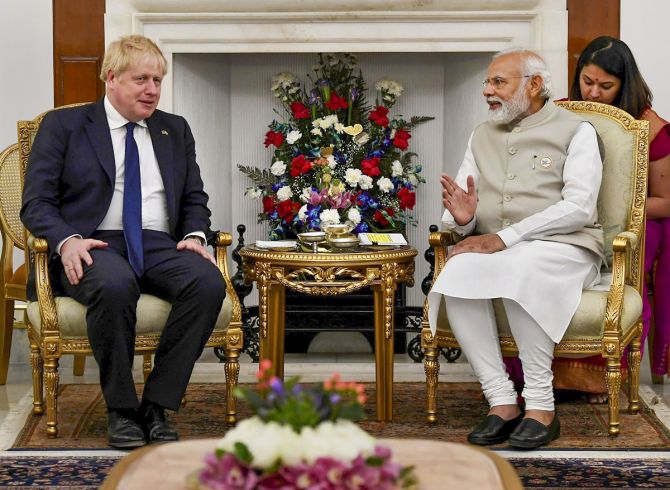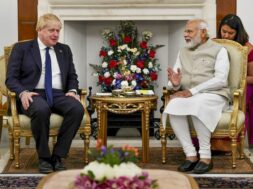
India – UK to Sign Free Trade Agreement by Diwali
Manas Dasgupta
NEW DELHI, April 22: The prime minster Narendra Modi and his British counterpart Boris Johnson on Friday jointly announced that India and the United Kingdom were on path to sign a free-trade agreement before the end of the current year.
While Modi earlier said he expected the agreement to be signed by the end of the current year, speaking later Johnson was more specific to say the he hoped the signing to be completed by Diwali in October. “As the next round of talks begins here next week, we’re telling our negotiators to get it done by Diwali…. this could double our trade and investment by the end of the decade,” the British PM said after his meeting with Modi in New Delhi.
Reiterating the commitment, Modi said he hoped to sign the pact by the end of the year as both the sides were working closely and making “good progress.” Citing the FTAs with UAE and Australia, he said the negotiations for the one with the UK were being done at the “same speed” and with the “same commitment.”
“We appreciate the tariffs being dropped by India on certain goods and commodities and in return, we too are dropping some tariffs we levy. We also look forward to the close cooperation shared between the UK’s NHS and India’s health services,” the British PM said. He said the UK was creating an India specific open general export license reducing bureaucracy and reducing delivery times for defence procurement.
Johnson who began his two-day visit to India with arrival in Ahmedabad in Gujarat on Thursday and reached New Delhi later in the evening, held a top-level meeting with Modi as the UK looks to increase its footprint in defence production in India, and new cooperation on clean & renewable energy.
Calling Modi his “khas dost” (dear friend), Johnson while avoiding topics related to the Russia-Ukraine conflict, said “threats of autocratic coercion have grown” in the past year since they had met virtually at the G-7 meeting. “It was great to see you at the G7. But since then, the threats of autocratic coercion have grown even further,” he said, with Modi by his side.
While addressing the media along with his British counterpart, Modi said, “While India is celebrating the “Azadi ka Amrit Mahotsav” (celebrations on the 75th year of independence), the UK Prime Minister’s visit is historic.” The two leaders stressed the progress of the Free Trade Agreement between the two countries, their climate commitments at Glasgow, and the need for a “free and open” Indo-Pacific.
Modi said the two leaders stressed the need for a ceasefire in Ukraine and the resolution of conflicts through dialogue and diplomacy. “We reiterated the importance of territorial integrity and sovereignty of all nations,” he said.
Britain and India have agreed to a “new and expanded” defence and security partnership, Johnson said. The two countries have a “shared interest in keeping the Indo-Pacific open and free”, he added, calling the new partnership “a decades-long commitment.” “We reiterated our support to a peaceful, stable and secure Afghanistan and an inclusive representative government. It’s essential that Afghan territory is not used to spread terror in other countries,” Modi said.
Last year, Johnson and Modi had agreed on a UK-India Comprehensive Strategic Partnership, announcing more than 530 million pounds in investment into the UK and committing to a deeper bilateral relationship across trade, health, climate, defence and security, and connecting our people. An ambitious “Roadmap 2030″ was also launched to steer the direction of the India-UK relationship in this decade. Modi said they reviewed progress on this roadmap today and set goals for the future.
While describing the India-U.K. relationship as a “beacon in stormy seas,” Johnson said the “UK’s partnership with India is a beacon in stormy seas as the world faces growing threats from autocratic states which seek to undermine democracy, choke off fair trade and trample on sovereignty.” He said he discussed next-generation defence and security collaboration across the five domains – land, sea, air, space and cyber – as the two countries face “complex new threats”. “UK will work with India to boost security in the Indo-Pacific, including new fighter jet technology, helicopters and collaboration in the undersea battlespace. PM will also discuss new cooperation on clean and renewable energy,” Johnson said.
Modi invited the UK to join India’s “National Hydrogen Mission” to deepen the two country’s climate and energy partnerships. “The UK and India are launching a virtual Hydrogen Science and Innovation hub to accelerate affordable green hydrogen, as well as new funding for the Green Grids Initiative announced at COP26, and collaboration on joint work on the electrification of public transport across India,” a UK release had earlier said. Officials said Johnson was expected to offer a series of technological collaboration, including in the field of building fighter aircraft.
“Our collaboration on the issues that matter to both our countries, from climate change to energy security and defence, is of vital importance as we look to the future. I look forward to discussing these issues with Prime Minister Modi in New Delhi today and working together to deliver a more secure and prosperous future for both our peoples,” Johnson had said in his first statement after a ceremonial welcome at the Rashtrapati Bhavan. A spokesperson from the British High Commission said the bilateral dialogue would include Indo-Pacific strategy and exchange of views on fighter jet technology, helicopters and the “undersea battlespace.”
The U.K. would also issue an Open General Export Licence (OGEL) to support greater defence and security collaboration in the coming decade. The OGEL would reduce bureaucratic interference and shorten delivery time for India’s defence procurement. This is the first British OGEL in the Indo-Pacific region.
In a bid to deepen defence cooperation, the UK will provide support for new Indian-designed-and-built fighter jets, offering the best of British know-how, Johnson said. He added that the UK would also seek to support India’s requirements for new technology to identify and respond to threats in the Indian Ocean.
Modi, meanwhile, said they had agreed to deepen cooperation in defence, including manufacture, technology, design and development, and in all these cases, welcomed UK’s support to India’s “Atmanirbhar Bharat” plan.
The two countries also discussed new cooperation on clean and renewable energy, aimed at supporting India’s energy transition away from imported oil, increasing its resilience through secure and sustainable energy, and addressing climate change in both the countries.
The UK and India are launching a virtual Hydrogen Science and Innovation hub to accelerate affordable green hydrogen, setting up new funding for the Green Grids Initiative announced at COP26, and initiating collaboration on joint work on the electrification of public transport across India.
“As well as boosting our domestic energy and economic resilience, the UK and India are collaborating as a force for good globally. Our governments are committing up to £75 million to roll out adaptable cleantech innovations from India to the wider Indo-Pacific and Africa, and working together on international development and girls education,” the British government said.
External Affairs minister S Jaishankar, who met Johnson just before the bilateral meeting, said, “Delighted to call on UK PM @BorisJohnson during his India visit. Discussed our expanding partnership and implementing the #IndiaUK Roadmap 2030.”













